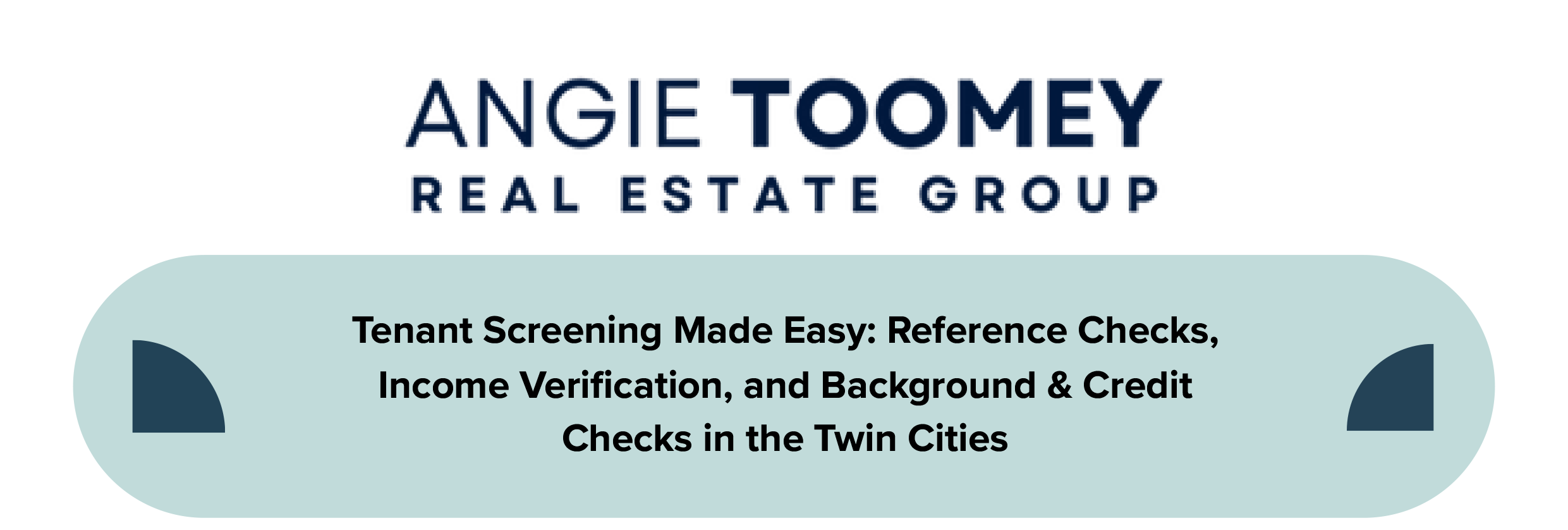
When it comes to tenant screening and leasing in the Minneapolis area, landlords know one thing for sure: the right renter can mean peace of mind, while the wrong one can mean late-night calls, unpaid rent, and maybe even a new carpet bill.
That’s why thorough tenant evaluation—covering reference checks, income and employment verification, background checks, and credit reports—isn’t just helpful. It’s essential for protecting your investment and ensuring a smooth leasing process.
At Angie Toomey Real Estate Group, we take the guesswork out of tenant screening so you can focus on enjoying the rewards of your rental property. Let’s walk through how smart landlords (and smart property managers!) find qualified renters who are more likely to stay long-term, pay on time, and respect your property.
Why Tenant Screening Matters
Think of tenant screening like online dating. Sure, the profile looks good—but will they show up on time, and will they treat your home (and you) with respect?
Screening isn’t about being picky; it’s about being smart. By taking the time up front, landlords avoid expensive mistakes later. In fact, studies show that evictions can cost anywhere from $3,500–$10,000 when you factor in legal fees, lost rent, and repairs.
A strong tenant screening process helps you:
- Avoid costly evictions 🚫
- Ensure timely rent payments 💰
- Protect your property investment 🏠
- Build long-term, positive landlord-tenant relationships 🤝
Reference Checks: Digging Beyond the Application
Applications tell you what tenants want you to know. References tell you the truth.
By calling past landlords and employers, you can confirm:
- Did they pay rent on time?
- Did they follow the lease terms?
- Did they leave the property in good condition?
- Were they respectful to neighbors?
💡 Pro Tip: Watch for “fake landlords.” Some applicants ask friends to pose as former landlords. Always cross-check references with property records or online listings.
Income & Employment Verification: Stability Matters
A tenant might be great in every way—but if their income doesn’t support the rent, problems will follow.
That’s why most landlords follow the 3x rule: monthly income should equal at least three times the rent.
Example: Rent: $1,500/month ⟶ Ideal tenant income: $4,500/month
Ways to verify income include:
- Recent pay stubs
- Employment verification letters
- Bank statements
- Tax returns (for self-employed applicants)
This step ensures tenants have financial stability and reduces the risk of missed payments.
Background & Credit Checks: Red Flags to Spot Early
Not every blemish is a dealbreaker—but knowing what’s there matters.
Credit Check: Reveals financial reliability. Look for consistent late payments, large unpaid debts, or past evictions.
Background Check: Ensures tenant safety and compliance. Criminal history may not always be relevant, but it should be reviewed in compliance with Fair Housing laws.
Eviction History: The biggest predictor of future evictions is—no surprise—past evictions.
🚩 Red Flags:
- Unexplained gaps in rental history
- Multiple late payments or collections
- Prior landlord disputes
The Leasing Process: From Application to Move-In
Screening is only half the battle—the leasing process is where everything comes together.
Application Submitted – Tenant fills out the rental form with references, employment, and income details.
Screening Conducted – Credit, background, income, and reference checks completed.
Approval – Landlord or property manager approves qualified tenants.
Lease Signed – Legal lease agreement outlines terms, rent, and responsibilities.
Move-In Day – Keys are handed over, and both sides start fresh.
💡 Bonus Tip: Provide a welcome checklist for tenants (utilities, mailbox setup, maintenance contacts). It builds goodwill right from the start.
How Angie Toomey Real Estate Group Helps Landlords
Managing this entire process can feel overwhelming. That’s where we step in.
At Angie Toomey Real Estate Group, we:
- Run comprehensive tenant screenings (reference, income, credit, background)
- Ensure full Fair Housing compliance
- Customize criteria for your property type and price point
- Handle lease drafting and tenant onboarding
- Offer ongoing property management support to minimize landlord stress
- We combine local expertise in the Minneapolis area rental trends with industry best practices, giving you the best chance of securing reliable, respectful tenants.
Benefits of Professional Tenant Screening
Save time ⏳ (no more endless calls to employers and past landlords)
Minimize risk ⚖️ (thorough checks catch red flags before move-in)
Build confidence ✅ (knowing your tenant is fully qualified)
Protect your bottom line 💵 (fewer vacancies, less turnover)
Avoiding Costly Mistakes with Tenant Screening
Many landlords skip steps because they feel awkward asking personal questions. But skipping tenant screening is like skipping a home inspection—you don’t see the problems until it’s too late.
Common mistakes to avoid:
- Accepting the first applicant without comparison
- Not verifying income and references
- Ignoring red flags in background checks
- Violating Fair Housing laws by applying inconsistent criteria
FAQs About Tenant Screening in the Minneapolis Area
Q: Can I deny a tenant based on credit score alone?
A: Possibly—but be careful. Always apply consistent criteria and comply with Fair Housing laws.
Q: How long does screening take?
A: Typically 24–72 hours, depending on how quickly references respond.
Q: Is professional screening worth the cost?
A: Absolutely. A small upfront fee can prevent thousands in losses later.



